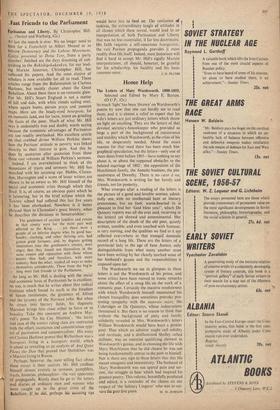.Fast Friends to the Parliament
Puritanism and Liberty, By Christopher Hill. (Seeker and Warburg, 42s.)
A r last the search is over: We no longer need to hunt for a Festschrift to Albert Meusel or to borrow Democracy and the Labour Movement, Essays presented to Dona Torr, from a party mei nber; finished are the days dreaming of sub- scribing to the Rekishigaktikenkytt, for our lead- ing Marxist historian, • Christopher Hill, has collected his papers. And the most elusive of scholars is now available for all to read. These articles range from the Reformation to Clarissa Harlowe, but mainly cluster about the Great Rebellion. About them there is no romantic glow. For Mr. Hill's Stuart England is not a matter of hill and dale, with white clouds sailing over, Where squire hunts, parson prays and yeoman reaps. Here are the beady-eyed bourgeois, fat on monastic land, out for lucre, intent on grinding the faces of the poor. Much of what Mr. Hill says is undeniably true and doubly worth saying because the economic advantages of Puritanism are too readily overlooked. His excellent article on that crabbed divine William Perkins shows how the Puritans' attitude to poverty was linked directly to their interest in gain. And this he does by quotation after quotation from those three vast volumes of William Perkins's sermons.
Indeed, I am overwhelmed to think of the mountains of tracts and sermons Mr. Hill has searched with his accusing eye. Hobbs, Claren- don, Harrington and a score of lesser writers are shown to be as aware as Mr. Hill himself of the social and economic crisis through which they lived.. It is, of course, an obvious point which he is labouring, but in the brief eclipse which the Tawncy school had suffered this last five years it has been oVerlooked. Nowhere is it better phrased than in Clarendon's great history, when he describes the divisions in Sornersetshire : The gentlemen of ancient families and estates in that county were for the most part well affected to the King; . . . yet there were a people of an inferior degree who, by good hus- bandry, clothing, and other thriving arts, had gotten great fortunes, and, by degrees getting themselves into the gentlemen's estates, were angry that they found not themselves in the same esteem and reputation with those whose estates they had; and therefore, with more industry than the other, studied all ways to make themselves considerable. These from the beg;n- ning were fast . friends to the Parliament. So long as Mr. Hill is dealing with the social and economic basis of Puritanism he is excellent; so, too, is much that he writes about that radical tradition which found its myth in the freedom of Saxon institutions, the greatness of Alfred and the tyranny of the. Norman yoke. But when he. strays into literary fields, his dogmatic Marxism brings him close either to farce or to banality. Take this comment on Andrew Mar- veil's poem 'To his Coy Mistress') 'the laxity and ease of the reptiler ruling class are contrasted with the effort, asceticism and concentration typi- cal of puritanism and commercialism.' His essay on Clarissa Harlowe proves that Richardson was a bourgeois living in a bourgeois world, which is about as revealing as an analysis of And Quiet Flows the Don that proved that Sholokhov was a Marxist living in Russia.
Perhaps, hoWever, the most telling fact about these essays is their sources. Mr. Hill confines himself almost entirely . to sermons, pamphlets, tracts, histories, philosophies--the vast apparatus At of propaganda. Rarely does he go to the letters
1 and diaries of ordinary men and women who were caught up in the great crisis of the Rebellion, If he did, perhaps his accusing eye would have Jess to feed on. The confusion ci motives, the extraordinary tangle of attitudes in all classes which these reveal, would lead to an interpretation of both Puritanism and Liberty that was no less materialist, if far less doctrinaire. His faith requires a self-conscious bourgeoisie; the vast Puritan propaganda provides it more readily than life itself. Indeed, most historians will find it hard to accept Mr. Hill's rigidly Marxist interpretations; all should, however, be grateful for his scholarship, his lucidity and his basic

























 Previous page
Previous page